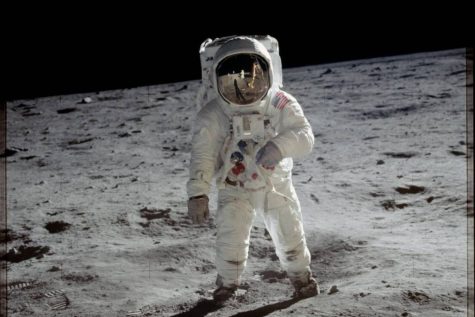Apollo 11 successfully lands in theaters
Released documentary footage of Neil Armstrong, Buzz Aldrin and Michael Collin’s manned mission to the moon
March 10, 2019
Watch the trailer here.
I’ll keep this short: Apollo 11 is a very simple documentary film, where released footage of the journey to the moon taken by the Apollo 11 space ship manned by Neil Armstrong, Buzz Aldrin and Michael Collins from Jul. 16-24, 1969, being the first manned mission to the moon at this point in history.
The movie recaps the footage of the launch taking place, their exchanged communications between them and Houston, and their time spend wandering about the desolate moon surface collecting data for scientific purposes. As the movie mentions, this moment is probably one of man’s greatest achievements, as these men have gone where no others have ever before at this point in time.

This is an original photograph taken of Buzz Aldrin standing on the surface of the moon during their manned Apollo 11 mission.
The imagery was really quite the most fantastic part about the movie, just because of how you’re seeing the exact shots taken from when they were actually there. The backstory behind it all is also quite intriguing, especially considering the risks being and the pressure put on these men for what they are doing.
Overall, the movie is only slightly different from your typical documentary, in that there is only narration when new scenes of the movie are introduced, and otherwise the only sound effects are music used to enhance the atmosphere. As one of few movies to receive a ‘G’ rating during this day and age, it’s a pleasant experience for the whole family, especially those who find interest space travel.
Fun facts about the moon:
1). The moon is roughly the distance of the combined diameter’s of all the planets in the solar system away from Earth.
2). There is no wind on the moon, so the astronauts’ footprints will always be there unless someone or something covers them up.
3). The same side of the moon always faces us, so the only way to see the other side is by spaceship.
4). You weigh about 0.0005% less when the moon is directly above your head.
5). The moon is the fifth largest satellite in the solar system.
(Facts obtained via Mashable.com)



